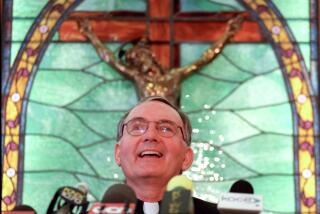Paul Moore Jr., 83; Episcopal Bishop in N.Y.
Paul Moore Jr., who while bishop of the Episcopal Diocese of New York in the 1970s and ‘80s took on presidents, mayors, business executives and members of his own church over a wide variety of issues, from corporate greed to women priests, died Thursday after a long struggle with brain and lung cancer. He was 83.
Moore’s most visible contribution to the city was the revitalization of the Cathedral Church of St. John the Divine in upper Manhattan, near Columbia University. The building was begun in the late 1800s, but construction stopped during World War II, and the full plan for the cathedral was never carried out.
Under Moore’s direction, work resumed in the early 1970s when he appointed the Rev. James Parks Morton as dean of the cathedral. Together, they brought to life the sleepy giant at 112th Street and Amsterdam Avenue.
On major religious holidays, Moore spoke from the cathedral pulpit, often in memorable terms. A champion of the city and the urban poor, he notably took up their cause on Easter Sunday 1976 at a time when corporate leaders were moving their businesses out of the area because of a recession. He accused them of adding to the city’s jobless and crime problems.
“Paul compared business executives leaving the city to rats leaving a sinking ship,” recalled the Rev. Stephen Chinlund, director of Episcopal Social Services in the diocese. “Another person might not have put it quite that way.”
In 1978, Moore accused New York Mayor Edward L. Koch of proposing “naive and dangerous” views on homelessness. The cleric was known to tell rich people they were selfish.
“It was not just to be abrasive,” said Chinlund, who worked with Moore at a congregation in Jersey City, N.J., in the early 1960s. “Paul knew it would take a sledgehammer to break through systems of injustice.”
Born to a life of privilege in Morristown, N.J., Moore was the grandson of a founder of Bankers Trust. After graduating from Yale University in 1941, Moore joined the Marines and, during four years of duty in World War II, he was awarded a Silver Cross, a Navy Star and a Purple Heart. He was badly wounded at Guadalcanal but recovered, and went on to lead a company of Marines in Guam.
War turned Moore into a peace activist. He protested the U.S. involvement in Vietnam in the 1970s and the nuclear arms race of the 1980s.
“As an ex-Marine and war hero, Paul’s voice carried double resonance in the antiwar movement,” Chinlund said. “There was never any question of his courage or commitment.”
Even after his retirement in 1989, Moore sometimes delivered sermons at St. John the Divine. In his last sermon in March, he spoke out against the U.S. invasion of Iraq. He said he was wary of President Bush’s reassurances that he takes time alone for prayer while making decisions.
Moore warned the congregation: “Your fate will be determined on the power of millions of people of all faiths against the war, and one solitary Texas politician being alone with Jesus.”
In his many years of accomplishments, Moore was especially proud of what he had done to revitalize his cathedral. A master stonemason was hired from England and an apprentice program for New York-area students interested in masonry was created.
Musicians and artists were invited to take up residence at the cathedral. One, French aerialist Philippe Petit, performed a high-wire walk in the nave for the cathedral’s 100th birthday celebration in 1986.
Moore was ordained an Episcopal priest in 1949. He was elected an assistant bishop in the Episcopal Diocese of Washington, D.C., in 1964. He was installed as bishop in New York eight years later.
He and his first wife, Jenny McKean, who died in 1973, had nine children; all survive him, as do 19 grandchildren. His second wife, Brenda Hughes, died in 1999.
More to Read
Sign up for Essential California
The most important California stories and recommendations in your inbox every morning.
You may occasionally receive promotional content from the Los Angeles Times.










